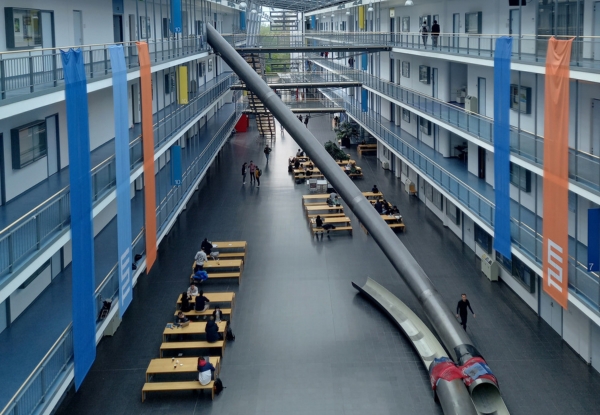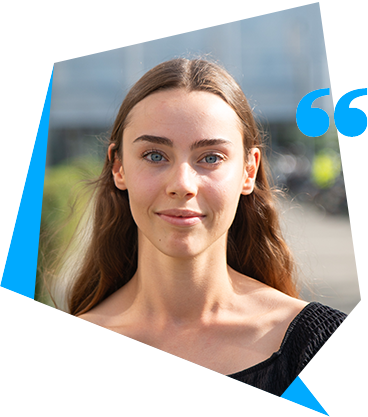< back to articles
6 months of substitution in Munich for Oriane
Published on
Oriane received support from the Foundation for a 6-month exchange program in Munich, Germany. While her primary objective was to deepen her knowledge of energy and the environment, and to perfect her German, she also took advantage of her stay to raise the profile of ISAE-SUPAERO beyond French borders, and to highlight the high quality of the teaching offered here, as well as the many opportunities available to its students! She tells us all about it.

Why did you choose to do a substitution stay in Munich?
The aim of my stay in Munich was todeepen my knowledge of energy and the environment, which were the main subjects of the courses I chose. I also enrolled in an intensive German language course, which (as I had hoped), combined with daily practice, enabled me to significantly improve my level in this language, which I had studied from sixth grade to the end of high school, and which I had resumed studying this year at ISAE-SUPAERO. As Germany is a country offering a wide range of jobs in sectors that appeal to me (energy, transport and the environment), I thought it would be a good idea to commit myself to a stay in the country, in order to acquire a secure command of the language and, why not, find a work placement in Germany at the end of my studies.
How was your stay at a German university?
Oriane Lehmann

Academically, I’m very satisfied with my time at Technische Universität München.
- For one thing, the university is very large. There are several campuses within the city. I studied at the Garching campus, north of Munich, which is a city in its own right. The architecture of the university is very pleasant, with many eco-responsible buildings and lots of greenery all around. The study buildings are very spacious and well laid out, with plenty of places for students to work, or simply to sit and chat. The university also boasts a number of sports facilities, including volleyball and badminton courts. Even though it’s constantly swarming with students, TUM remains a very quiet and pleasant place to visit.
- On the other hand, I really enjoyed the courses I took there. I was able to perfect my German and Italian in language classes. The “Sprachzentrum”, TUM’s language center, offers a wide range of courses in different languages and at different levels, from grammar to history, debating and literature. Once a month, we also organize “Länderabende”, evenings devoted to discovering the culinary culture of a particular country. It’s a great opportunity to meet students from all over the world! As for the scientific courses, I was able to study in detail the infrastructures adapted to solar and wind energy, the dynamics of compressible fluids, acoustics and the different types of heat transfer. Even though these courses were very different from one another, they often overlapped, which made for a pleasant learning experience, as the concepts seen in one course were revisited in another, without it all being too repetitive. I particularly appreciated the emphasis placed by most of the teachers on the physical understanding of the phenomena behind the equations. This semester at TUM has greatly enriched the engineering vision I developed during a year and a half at ISAE-Supaero!
How would you sum up your stay in terms of culture?
The aim of Erasmus is not just academic, you might say. In Erasmus, learning and discovery take place in a thousand different ways. Getting around in your new city, communicating with the locals, meeting your future friends, traveling – it’s all part of the adventure!
Getting around Munich is no easy task. Want to get to Bavaria by train? You’ll soon discover the wonders of Deutsche Bahn, the German SNCF, but with a reputation far worse than that of the SNCF (and, speaking from experience, that’s saying a lot!). Once in Munich, you can choose between a multitude of trains, metros and buses, which have the advantage of being very spacious (getting back on the Toulouse metro was a shock to me) but the disadvantage of taking about an hour to get you where you want to go, because the city is so big! My best advice: take any line to Marienplatz, the heart of the city! Once there, take exit C. Be careful, there are at least 10 exits, and if you take the wrong one, you’ll find yourself 10 minutes from where you originally wanted to be! Once you’ve taken exit C, all you have to do is turn around to contemplate the Rathaus, the city hall, and, in the background, the twin domes of the Frauenkirche, Munich’s cathedral, silhouetted against the sky. A few steps away, for the modest sum of 3 euros, you can climb up to St Peter’s Kirche, which offers a breathtaking view of the whole city, and if the sky is clear, you can even see the mountains looming on the horizon! From here, you can take line 6 to the huge Englischer Garten, or line 3 to the Olympic Park, Olympiapark. In summer, you’ll find a number of noteworthy events here, including exhibitions, concerts by Coldplay or Taylor Swift, and even the Euro fan zone! Munich’s parks are immense and truly a city must-see. Without doubt, the best place to relax in summer!
Many other interesting things are also within easy reach from Munich. In Berlin (only a few hours away by bus), I had the opportunity to meet up with other school friends. The city is simply immense (8 or 9 times the size of Paris, I think)! I have to admit that I preferred the more welcoming Munich to the German capital, although the latter is a must-see for its history and cosmopolitan, teeming culture. I was also able to visit Austrian villages such as Salzburg (Mozart’s birthplace) and Hallstatt, and go hiking in the Austrian and Bavarian Alps. The latter was certainly one of the best parts of my Erasmus in Munich. Hiking all weekend, getting away from it all in the forest, swimming in Germany’s magnificent lakes… I highly recommend Lake Eibsee, known as the country’s most beautiful lake! And let’s not forget the incredible castles of Ludwig II of Bavaria, the most famous of which, Neuschwanstein, inspired Disney’s famous Sleeping Beauty castle! The area is also great for hiking, with breathtaking views of the castle!
In terms of language now, I sincerely believe that the best thing you can do to learn a language is to try to blend in with the locals. Admittedly, this isn’t exactly easy when you’re surrounded by students from all over the world, all of whom generally use English to communicate. Even the locals will speak English to you at the slightest hint of a French or foreign accent in your voice! So it’s not easy to make progress. For my part, I chose to go to a place where I’d be forced to listen to German and understand it. So I went to Munich to take dance lessons, and as all the classes were in German, I listened to the language for several hours a week, and what’s more, I could associate visual elements with the lyrics, which made understanding much easier and my progress much quicker! That said, I cheated a bit, because the teacher was French, and it’s immediately much easier to understand German pronounced by a Frenchman than German pronounced by a Bavarian! We had to start by learning the Bavarian dialect. The basics: to say “bonjour” or “salut”, you don’t say “hallo” but “servuss” (pronounced “zervouce”).
Do you have a highlight to share with us?
My penultimate day in Munich is undeniably one of the most amazing days of this adventure. It was a Thursday evening, around 8pm. All my suitcases and bags were packed, my final exam, which took place the following day, had been duly revised, my return tickets had been booked – in short, everything was perfect! So, having decided to give myself a little time to decompress, I headed for the kitchen to prepare a delicious lemon cake. But I didn’t count on the clumsiness of my roommate, who spilled a glass salad bowl on my leg! I ended the night in the emergency room, stitched up by a doctor who only spoke German, 13 stitches and 155 euros less later (my European health insurance card had had the good idea to expire a week before), I went home to spend my last night in Munich. I’ll never forget my stay in Munich, and it’s engraved in my flesh forever.
Any final words to sum up this experience?
This substitution semester was an opportunity for me to promote ISAE-SUPAERO abroad. Indeed, through my exchanges with other international and local students, I was able to put our school on the map beyond France’s borders, and highlight the high quality of the teaching it provides, as well as the many opportunities available to its students. I hope I’ve been able to promote our school in a foreign university recognized as the best in its country. Finally, I intend to highlight the environmental dimension of my courses to show that ISAE-SUPAERO is a socially aware school, working to meet the social and environmental challenges of today and tomorrow.